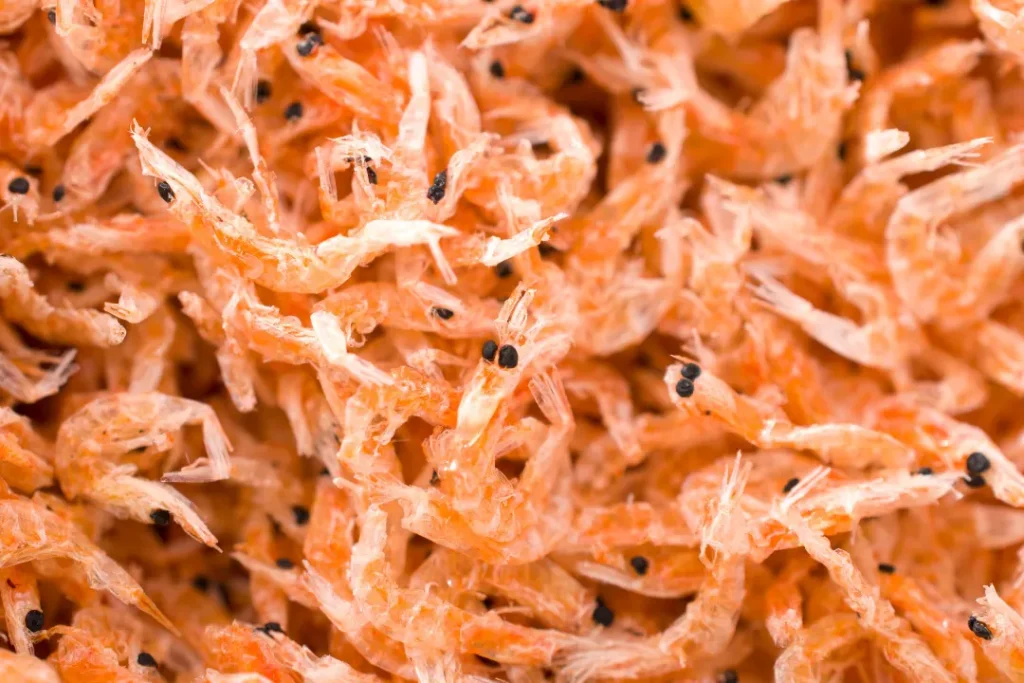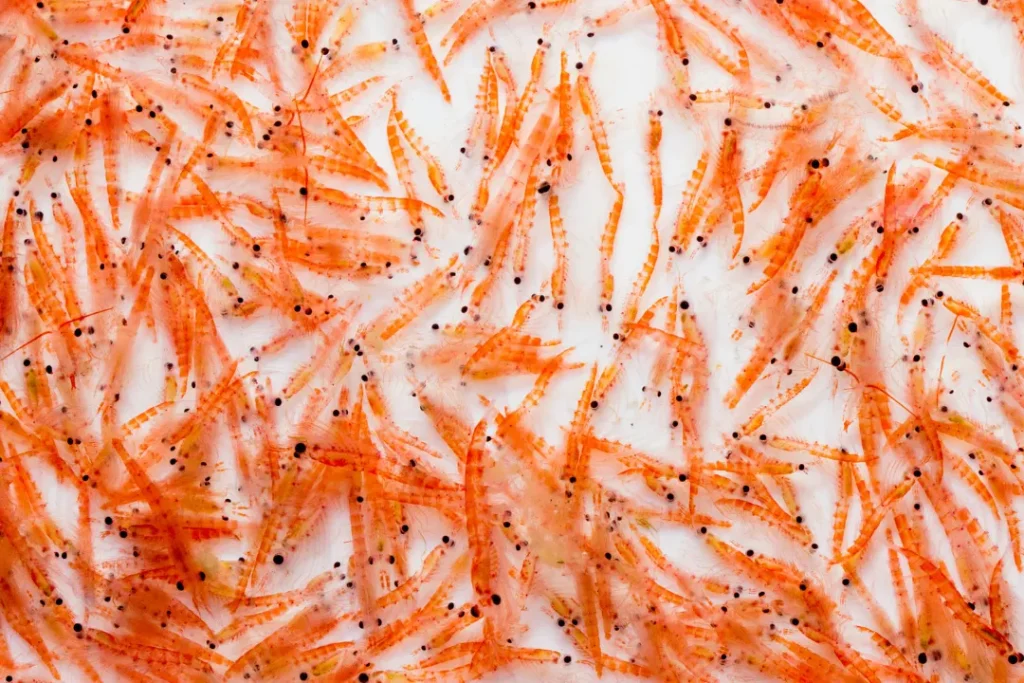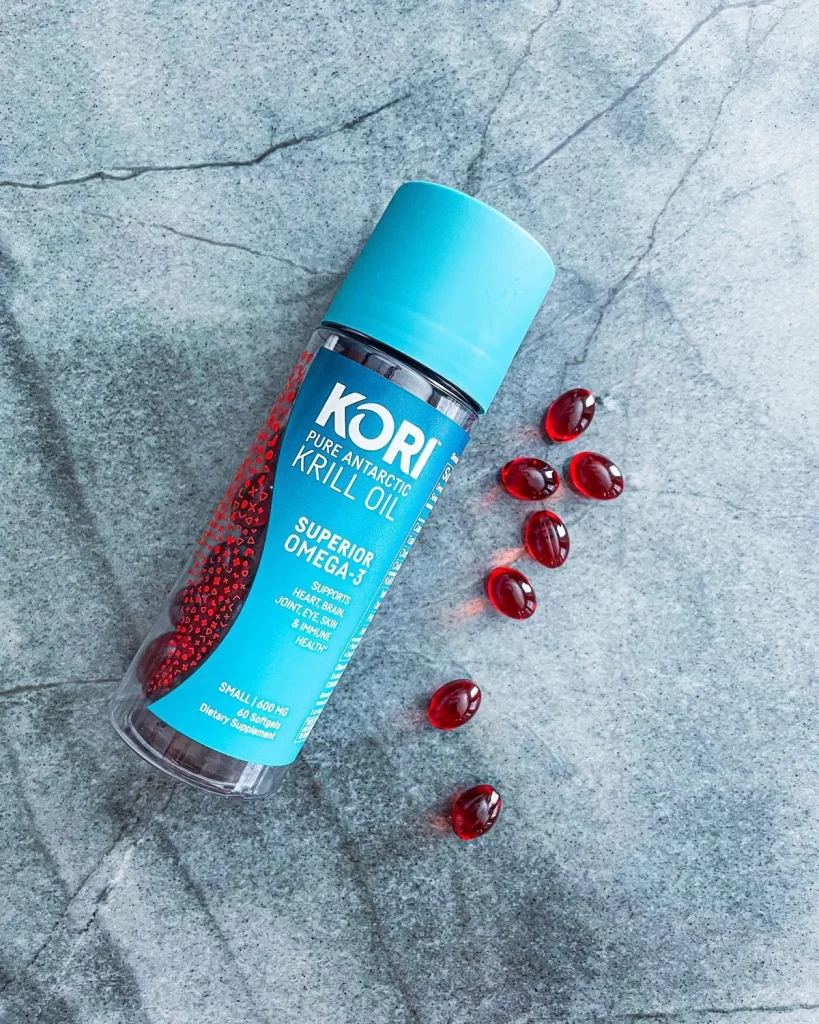Kori Krill Oil is making an impact on the market for highly beneficial krill oil while ensuring the sustainability and long-term viability of the Antarctic krill population. Thanks in large part to Kori Krill Oil’s initiative and commitment, the harvest is sustainable and protected for the benefit of present and future generations. This award is in recognition of Kori Krill Oil’s dedication and ongoing efforts.
Kori Krill Oil Wins Award and Consumer Confidence as a Sustainable, Eco-Friendly Brand is an original (BiohackingNews&Trends) article.
The lifesaving benefits of krill oil omega-3s
Krill are tiny shrimp-like crustaceans thriving abundantly in the icy, pristine waters of Antarctica. They are harvested for their oil, which is a rich source of omega-3 phospholipids, an unsaturated fatty acid recognized for its many health benefits. Omega-3s from krill oil reduce inflammation and help improve heart health, brain health, immune health, joint health, eye health, and skin health.
The global krill oil market
The increasing value of krill oil is now reflected in its market size and projected growth. “The global krill oil market was valued at USD 235.8 million in 2020 and is expected to grow at a CAGR of 11.4% during the forecast period, reaching USD 474.0 million by 2028. Rising health awareness among consumers and the growing elderly population are key factors that drive the growth of the market,” reports Polaris Market Research.
The eco-friendly mission to protect the source of krill oil
Kori Krill Oil’s commitment to sustainability is definitive: “We are a team of scientists, fishermen, health aficionados, and earth lovers passionate about Antarctic krill.” The company believes that advances in science and increased attention to our health may be leading us to live longer lives, but we want to live more fully, live better, and not just live longer:
“We believe that Antarctic krill is one of the most brilliant resources we have to promote human health, and we are excited to share our passion and scientific expertise with you.”
Kori Krill Oil CEO Nancy Chan explains that “Sustainability is at the heart of our operations and our brand,” earning the eco-friendly fishery that supplies Kori Krill Oil the highest sustainability credentials. “When you can support consumers’ health while also being responsible for the planet—you create more loyalty by connecting with the shared value of your consumers.”
The Antarctica-based krill fishery that is qualified to be the exclusive supplier of Kori Krill Oil is notable for low harvesting levels and is recognized globally as an industry leader in sustainability:
It is the only fishery to earn an “A” rating for seven consecutive years from the Sustainable Fisheries Partnership—an organization that is internationally recognized for its industry-leading practices to deliver the highest quality krill while protecting the oceans.
Stewardship certification from Friend of the Sea, whose certification program contributes to the health of the oceans by certifying and promoting sustainable fishing practices, confirms no endangered species are caught during operations and no adverse impact is imposed on the ecosystem.

Eco-friendly harvesting prevents bycatch
Kori Krill Oil’s fishery utilizes an “eco-harvesting technology” that includes a continuously submerged mid-water vacuum that draws in the krill, and only the krill, because the vacuum is guarded by a fine mesh net that prevents anything larger than krill from entering. This eco-friendly technology has been developed through years of research and investment; as a result, bycatch—the unintended capture or harvest of marine life other than krill—is negligible, as there is minimal opportunity for other species to enter the vacuum.
Managing krill harvesting levels
Kori Krill Oil is committed to preserving the sustainability of krill and other wildlife in the Antarctic. A primary objective of the company and its sustainability partnerships is to ensure the long-term viability of the krill population. A key element of this objective is to impose strict limits on how much is harvested. In total, less than 1% of the Antarctic krill biomass is harvested annually, which is well below the 10% level set by the UN in their definition of a sustainable fishery:
Independent observers on the harvesting vessels in Antarctica provide year-round transparent and detailed reporting of catch volumes and bycatch to the relevant authorities.
Voluntarily imposed buffer zones prevent fishing near areas that may be inhabited by other species.
Kori Krill Oil’s sustainability partners
Kori Krill Oil has formed partnerships with organizations dedicated to the entire Antarctic biosphere, working to effectively protect this last truly pristine and uncontaminated place on Earth. These three eco-friendly partners are highly influential in facing the ongoing challenges of conservation and environmental stewardship:
- Antarctic Wildlife Research Fund (AWR): This partnership of global NGOs (Non-Governmental Organizations) committed to environmental protection facilitates and promotes third-party research on the Antarctic ecosystem. AWR was created to ensure a resilient Antarctica in which the management of all natural resources relies on precaution and up-to-date knowledge.
- The Commission for the Conservation of Antarctic Marine Living Resources (CCAMLR) adopts conservation measures for all fisheries operating in Antarctica, specifying how much and where the seafood can be caught, as well as the acceptable bycatch levels.
- The Association of Responsible Krill Harvesting Companies (ARK) strives to ensure that the Antarctic krill harvesting industry develops in sustainable ways to guarantee the future viability of the krill population. ARK is a partnership of global NGOs and krill fisheries. The total fishing capacity of ARK members represents over 90% of all krill catches in CCAMLR waters.

Vertical integration and sustainable packaging
Kori Krill Oil is the only vertically integrated krill oil brand responsible for every stage of the route from nature to market. The company’s advanced sustainable harvesting practices deliver quality products from catch to extraction and processing to the delivery of each bottle of Kori Krill Oil while protecting the marine ecosystem.
Consistent with the spirit of eco-friendly sustainability and environmental responsibility, all Kori Krill Oil boxes and bottles are 100% recyclable, including caps and labels.
The best source of omega-3 phospholipids
The two most essential omega-3 fatty acids—DHA and EPA—are available only from seafood, but most Western diets prefer meat and poultry, with little or no fish. As a result, 70% of Americans are deficient in their omega-3 levels. “When I realized how deficient in omega-3 people are, I made it my mission to create a brand that makes a difference to the health and wellness of Americans,” explains Nancy Chan.
Fish oil has traditionally been used as a source of omega-3s; however, krill oil is a significantly more effective source. Laboratory testing shows that krill oil provides omega-3 DHA and EPA in their most natural phospholipid form; fish oil tends to lose phospholipids during the extraction process, so its omega-3s are not as effectively absorbed or digested.

Achieving the USDA-approved weekly quota of omega-3 phospholipids
The USDA recommends two weekly servings of salmon or other cold-water fatty fish to provide the necessary daily amount of omega-3 DHA and EPA phospholipids. A simple daily supplement of 1,200 mg Kori Krill Oil softgels or citrus-flavored gummies meets the USDA daily quota.
Kori Krill Oil is natural, non-GMO, with no artificial flavors, colors, or preservatives. It’s fully digestible with no “fishy” aftertaste.
Kori Krill Oil can be ordered online at the company’s website and at Target, CVS, Walmart, Sam’s Club, Rite Aid, Walgreens, Kroger, H-E-B, VitaCost, Swanson, and Amazon.

About
Biohacking News And Trends (BNAT) is a digital publication.
Important Note: The information contained in this article (Kori Krill Oil Wins Award and Consumer Confidence as a Sustainable, Eco-Friendly Brand) is for general informational purposes only, and should not be construed as health or medical advice, nor is it intended to diagnose, prevent, treat, or cure any disease or health condition. Before embarking on any diet, fitness regimen, or program of nutritional supplementation, it is advisable to consult your healthcare professional in order to determine its safety and probable efficacy in terms of your individual state of health.
Regarding Nutritional Supplements Or Other Non-Prescription Health Products: If any nutritional supplements or other non-prescription health products are mentioned in the foregoing article, any claims or statements made about them have not been evaluated by the U.S. Food and Drug Administration, and such nutritional supplements or other health products are not intended to diagnose, treat, cure, or prevent any disease.